We've all experienced those moments: waking up to find a surprise visitor on our face just when we have an important event or meeting ahead.
Whether it's a lone pimple or a collection of spots, acne is a common issue that doesn't discriminate based on age or gender. It affects both males and females across different age groups.
Acne, scientifically known as acne vulgaris, arises when the skin's glands produce an excess amount of natural oil, known as sebum. This sebum, when combined with dead skin cells, can block the skin's pores, leading to the formation of acne. Additionally, the presence of bacteria, such as Cutibacterium acnes , within these pores result in inflamed acne.
Symptoms of Acne
Acne stands as the prevailing skin issue affecting individuals across the United States. A staggering fifty million Americans grapple with acne, with the majority encountering it during their teenage or young adult years. Statistics suggest that about 80% of teenagers will eventually experience acne.
Acne encompasses a spectrum of breakout types, each exhibiting distinct symptoms. Different classifications of acne are:
- Whiteheads: These emerge when a closed pore gets congested with oil and dead skin cells, resulting in a white bump on face.
- Blackheads: Unlike whiteheads, blackheads occur when a pore is only partially obstructed and remains open. They acquire their dark coloration when oil and dead skin cells react to air.
- Papules: Characterized by tiny, red, and firm pimples, it forms due to presence of bacteria within a pore.
- Pustules: There are more tough form of papules and its contain pus composed of dead white cells.
- Nodules: These sizable, inflamed lesions develop when a pimple moves into deeper under the skin.
- Cystic Acne: Representing a severe form of acne akin to nodules, cystic acne arises when deeper layers of the skin become inflamed. Cysts contain pus and manifest as soft, painful, and challenging to treat red lumps.
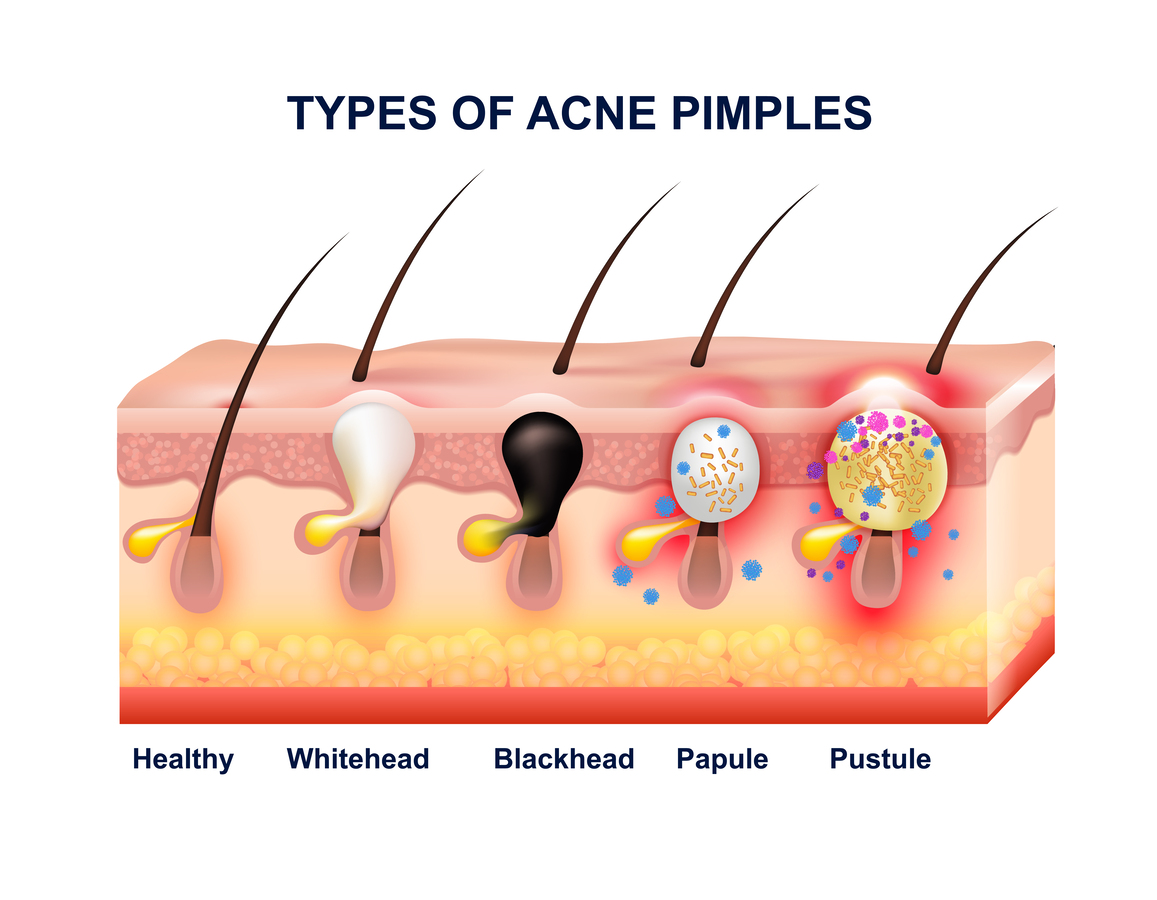
Similarly, acne's severity varies depending on the subtype. While blackheads and whiteheads are generally noninflammatory and more manageable, papules and pustules constitute inflammatory acne types. However, the presence of inflammation does not always indicate severe acne.
Individuals with mild acne may show a few whiteheads, blackheads, and up to ten inflamed red pimples called papules or pustules. Conversely, moderate acne can involve numerous blackheads, whiteheads, and inflamed acne pimples.
Severe acne involves the presence of nodules and cysts or multiple breakouts across various body regions, including the face, back, neck, and chest. Occasionally, severe acne may meet the criteria for acne fulminans, an uncommon, highly inflammatory form of acne predominantly affecting male patients aged between 13 and 22 years.
Individuals with severe acne typically show numerous red, inflamed pimples concurrently. They may also experience several deep cysts and nodules, which pose greater treatment challenges and often result in scarring.
Causes and Contributing Factors of Acne
Understanding the basic recipe for acne – oil and dead skin cells clogging pores – is only half the story. The real head-scratcher is why some faces become breakout battlegrounds while others remain enviably clear. Here are some reasons that may be one of the causing factors behind your Acne
Hormones disturbance : Shifts in hormone levels, like those that occur during puberty or menstruation, can trigger your oil glands to go into overdrive.
Cosmetic Products : Beware of oil-based makeup and skincare products! These can act like tiny traffic cones, blocking your pores and increasing your chances of breakouts.
Genetic Issue : Acne can run in the family. If your parents or close relatives battled breakouts in their youth, you might face similar challenges.
Medication & Acne :Some medications, like corticosteroids, can actually list acne as a potential party crasher. If you think a med might be causing your breakouts, chat with your doctor about alternative options.
Pressure on Skin: Friction from clothing or accessories, such as headwear, helmets, and even face masks, can exacerbate breakouts. The recent increase in "mask acne" during the pandemic underscores this phenomenon, supporting existing dermatological research on the link between skin friction and acne development.
Stress & Acne : Feeling stressed out? You're not alone. Stressful situations can elevate cortisol levels in your body. Cortisol can basically tell your oil glands to go into overdrive, creating a breeding ground for pimples to pop up.
Acne Diagnosis Process
Typically, a medical professional or dermatologist can diagnose acne through a visual assessment of your skin. They will carefully inspect your face, chest, back, and any other regions where acne manifestations are present.
Occasionally, certain skin conditions may be misinterpreted as acne. If you suspect acne but notice no improvement or a deterioration in your skin despite treatment, consulting your doctor can facilitate an accurate diagnosis.
The Unpredictable Path of Acne: How Long Will It Last?
The duration of acne can differ significantly from one individual to another. For many, acne tends to diminish in significance as they moves into their mid-twenties after initially appearing during adolescence.
However, some individuals may deal with acne well into their twenties. Surprisingly, around three percent of adults aged 35 and above experience intermittent bouts of acne.
Conquering Acne: Your Treatment Guide to Clearer Skin
Acne doesn't have to be a lifelong battle. There's a whole army of treatments out there, ready to help you fight breakouts and achieve clearer skin. The key weapon in your arsenal? Understanding that the best approach depends on the severity of your acne. A dermatologist can assess your individual situation and create a personalized plan to help you win the war against breakouts.
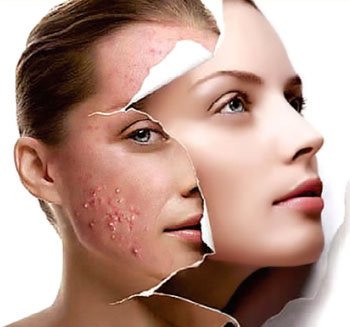
1. The Drugstore Warriors: Over-the-Counter Options for Mild Acne
For occasional breakouts or mild acne, a good skincare routine can be your best friend. Luckily, drugstores offer a variety of over-the-counter fighters to combat those pesky pimples. These products come in various forms like cleansers, lotions, creams, gels, and even face pads. But the real power lies in the ingredients they contain:
Troop 1: Exfoliators: Salicylic acid and glycolic acid work like tiny warriors, gently buffing away dead skin cells that can clog pores.
Troop 2: Oil Fighters: Benzoyl peroxide is a superstar for stubborn body acne, helping to reduce oil production.
Troop 3: Anti-Inflammatory Fighters: Niacinamide and azelaic acid calm things down, reducing inflammation and redness.
Troop 4: Cell Turnover Specialists: Topical retinoids encourage healthy skin cell turnover, keeping pores clear and preventing future breakouts.
Remember, the best weapon for you depends on your unique enemy (your acne!). If you're facing more severe breakouts, a dermatologist can help you develop a personalized battle plan.
2. Level Up Your Treatment: Prescription Options for Persistent Acne
Over-the-counter products are a great first line of defense, but sometimes acne requires a more targeted approach. If your breakouts are persistent or severe, a dermatologist can assess your specific situation and prescribe a personalized treatment plan. These prescription medications come in various forms like ointments, creams, or lotions and offer a wider range of options compared to drugstore products:
- For Targeted Attack: Oral and topical antibiotics directly combat the bacteria that contribute to breakouts.
- Hormonal Harmony: For some individuals, hormonal fluctuations can worsen acne. Oral contraceptives for women and topical or oral antihormonal medications can help regulate hormones and reduce breakouts.
- Cellular Regeneration Power: Retinoids, familiar from the over-the-counter section, come in even more potent prescription formulations. These medications promote healthy skin cell turnover, keeping pores clear and preventing future breakouts.
- Quick Relief (Used Sparingly): Corticosteroid injections can provide rapid relief for inflamed acne cysts, but due to potential side effects, their use should be limited and closely monitored by a dermatologist.
- The Big Guns (Use with Caution): Isotretinoin (Accutane) is a powerful medication reserved for severe acne cases. It requires close supervision by a dermatologist due to potential side effects.
Remember, prescription medications are not a one-size-fits-all solution and can have side effects. Working closely with your dermatologist is crucial to find the right treatment plan and manage any potential side effects effectively.
3. Dermatology Procedures
For persistent acne, Treatments like laser resurfacing, chemical peels, light therapy, steroid injections, or drainage and extraction of cysts and pimples are preferred. These procedures are particularly useful for stubborn cases of acne.
4. Nature based treatment
While conventional acne treatments are widely accepted and effective, you might consider integrating home remedies into your regimen as a complementary approach. Although these remedies may not match the efficacy of medications or procedures, they often come with fewer side effects. Some acne medications can induce dizziness, upset stomach, sun sensitivity, and even blood clots.
Some natural ingredients that are believed to have acne-fighting properties include:
- Cucumbers
- Honey
- Yogurt
- Oatmeal
- Turmeric
However, it's important to note that further research is necessary to fully understand the effectiveness of these acne home remedies.
Become Your Own Skincare Sleuth: Unlocking the Secrets to Clearer Skin
Understanding the triggers behind your acne is only half the battle. The real power lies in uncovering what works best for YOU. Here are some investigative tips to experiment with and personalize your daily routine for breakout-free, radiant skin
1. Washing your face twice a day is a great way to fight breakouts, but finding the right cleanser is key! Harsh scrubs and super hot water can be too much for some skin types. Instead, experiment with lukewarm water and a gentle cleanser. See how your skin reacts! If you experience tightness or dryness, maybe a creamier cleanser is best. Oily skin might prefer a foaming formula. Finding your perfect cleanse is like solving a skincare mystery – personalize your routine and watch your skin glow!
2. Greasy or oily hair can contribute to skin oiliness and pore clogging, leading to acne. Maintain clean hair by washing it regularly and keeping it off your face.
3. Opt for skincare products labeled as “noncomedogenic,” as they are less likely to clog pores and trigger acne breakouts.
4. Sleeping with makeup on can clog pores and worsen acne. Ensure to remove all traces of makeup before bedtime using oil-free makeup remover wipes or micellar water as part of a double-cleanse routine.
5. Fidgeting with your face is tempting, but those fingers can be undercover agents for oil and dirt, wreaking havoc on your breakout-prone areas. The culprit? Sebaceous glands, which produce oil and are concentrated on your forehead and face. The more you touch, the more you transfer oil and dirt, clogging pores and fueling breakouts.
Here's the trick: be mindful! Once you're aware of the hand-to-face habit, you can break it. Try fidgeting with a stress ball instead, or keep tissues handy to gently dab your face if needed.
Acne and Nutrition: What You Need to Know
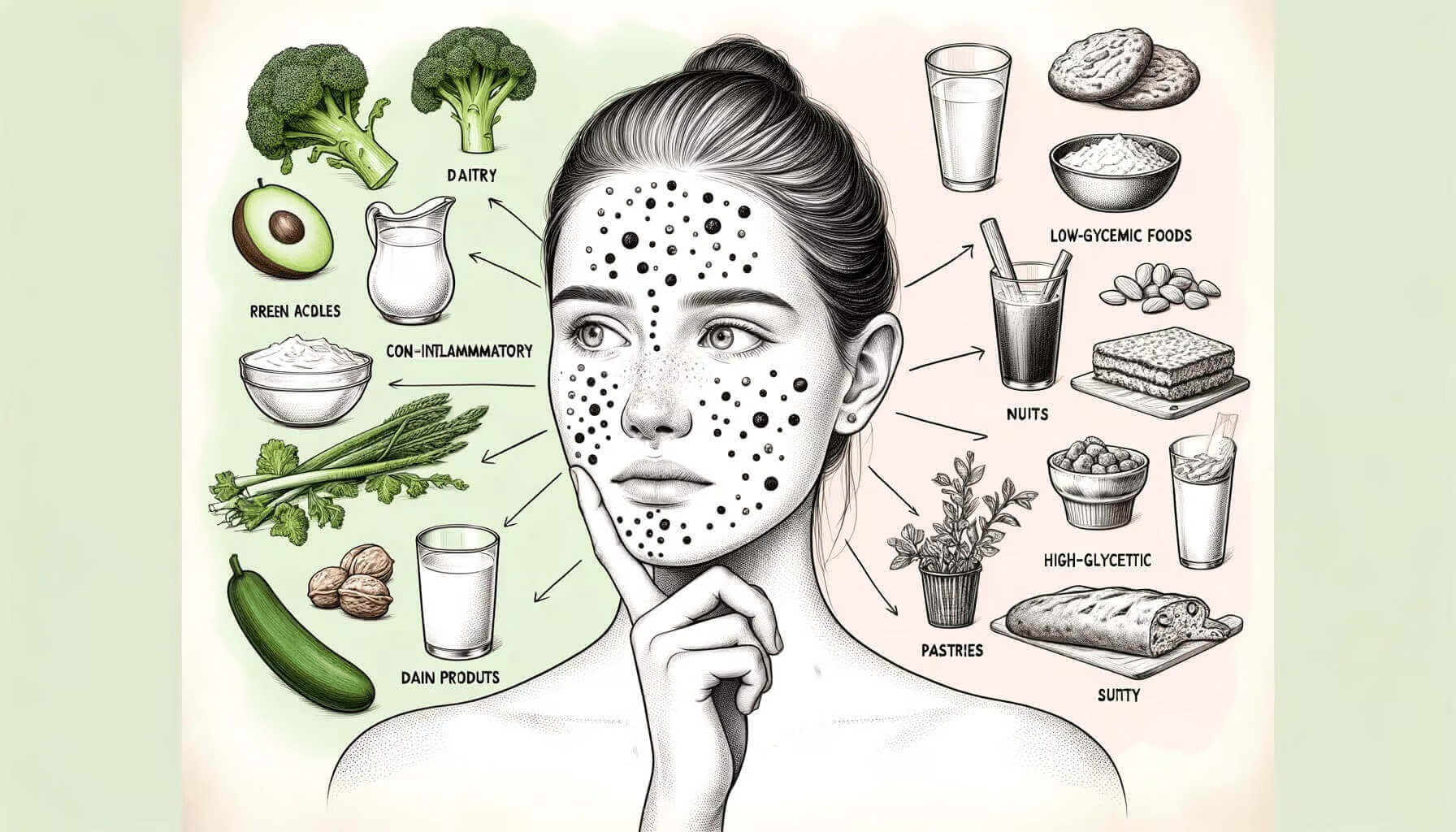
The age-old question: does that slice of pizza cause pimples? The truth is, the jury's still out on the exact link between diet and acne. While some registered dietitians and researchers point the finger at sugary drinks, chocolate, and greasy foods, others aren't entirely convinced.
While the exact link between food and breakouts remains a mystery, some studies suggest a potential connection. Research suggests a correlation between higher acne severity and consuming sugary drinks, refined carbs, and dairy products.
One interesting study followed teenagers (aged 14-17) and found a link between milk consumption, particularly low-fat or skim milk, and acne. However, it's important to note that correlation doesn't necessarily equal causation. More research is needed to fully understand how these foods might influence breakouts.
A recent research on girls found a similar association between acne and whole milk intake. Dairy products like milk are believed to increase insulin-like growth factor levels, which can boost sebum production and intensify breakouts.
Moreover, foods with high glycemic index , such as sugary treats and refined carbs, can lead to blood sugar spikes and subsequent skin inflammation. This may prompt the skin to produce more oil, worsening acne symptoms.
While the definitive impact of diet on acne remains uncertain, A balanced diet for individuals with acne should prioritize anti-inflammatory foods with a low glycemic load. Examples include cold-water fish like mackerel and salmon, leafy greens, nuts, seeds, and complex carbohydrates such as wild rice and quinoa.
Acne Scars
Acne often leaves behind scars, which can be bothersome and take a considerable amount of time to fade away, ranging from weeks to months.
Scarring is more common in cases of moderate to severe acne and manifests as dark marks or spots where acne used to be.
To minimize the risk of scarring, it's crucial to refrain from touching, squeezing, or picking at acne lesions. Utilizing pimple patches, which often contain salicylic acid, can help treat breakouts while preventing further aggravation.
If scars persist, consulting a doctor is advisable. They may prescribe acne medications that not only treat existing blemishes but also promote collagen production, which aids in reducing scar visibility.
Various procedures, such as dermabrasion, microdermabrasion, chemical peels, micro-needling, laser treatments, fillers, and punch excisions, are available to diminish or eliminate acne scars, depending on individual needs and preferences.
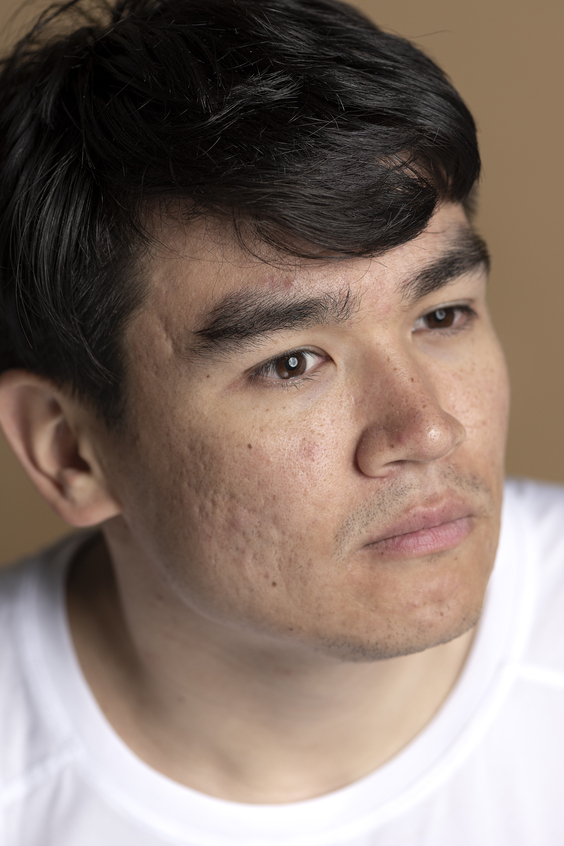
Demographics of Acne ( Stats )
Acne is a prevalent skin condition, impacting a substantial portion of the population in the United States, with estimates suggesting up to 45-50 million individuals are affected annually. While traditionally associated with adolescence, there's a noticeable rise in acne cases among adults, particularly affecting around 12-15 percent of women.
Clinical investigations indicate that persistent, mild acne is prevalent among approximately 40-50 percent of adults.
Beyond its physical effects, acne can also pose financial challenges for some individuals. An estimated 5.1 million people sought professional treatment for acne, highlighting the socioeconomic impact of this condition.
Associated Factors and Conditions of Acne
While acne primarily stems from pores getting blocked by dead skin cells or debris, its occurrence can be influenced by various factors and accompanying conditions, often linked to hormonal fluctuations. Some related conditions include:
- Psychological conditions like anxiety
- Emotional factors such as depression and stress
- Polycystic ovary syndrome (PCOS)
- In Women , due to Menstruation and Pregnancy.
Common Misconceptions About Acne
Clearing up acne can feel like navigating a maze filled with conflicting advice. Unfortunately, some well-meaning myths floating around can actually worsen breakouts instead of banishing them. So, how do you find the right path to clear skin?
For example, the notion that it's okay to manually pop pimples is incorrect. While doctors can safely perform extractions, doing it yourself increases the risk of scarring and introduces bacteria from your hands to your face.
Another common misconception is that sun exposure can cure acne. In reality, spending time in the sun can actually make acne worse, especially when using certain acne medications that increase skin sensitivity to sunlight. Prolonged sun exposure without proper sunscreen protection not only aggravates acne but also raises the risk of skin cancer.
People with acne-prone skin should choose oil-free products to avoid blocking pores. Additionally, mineral sunscreen is recommended for sensitive skin, as these formulations are less likely to cause pore congestion.
Instead of relying on hearsay, it’s wise to consult a doctor or dermatologist for accurate advice and effective acne management.

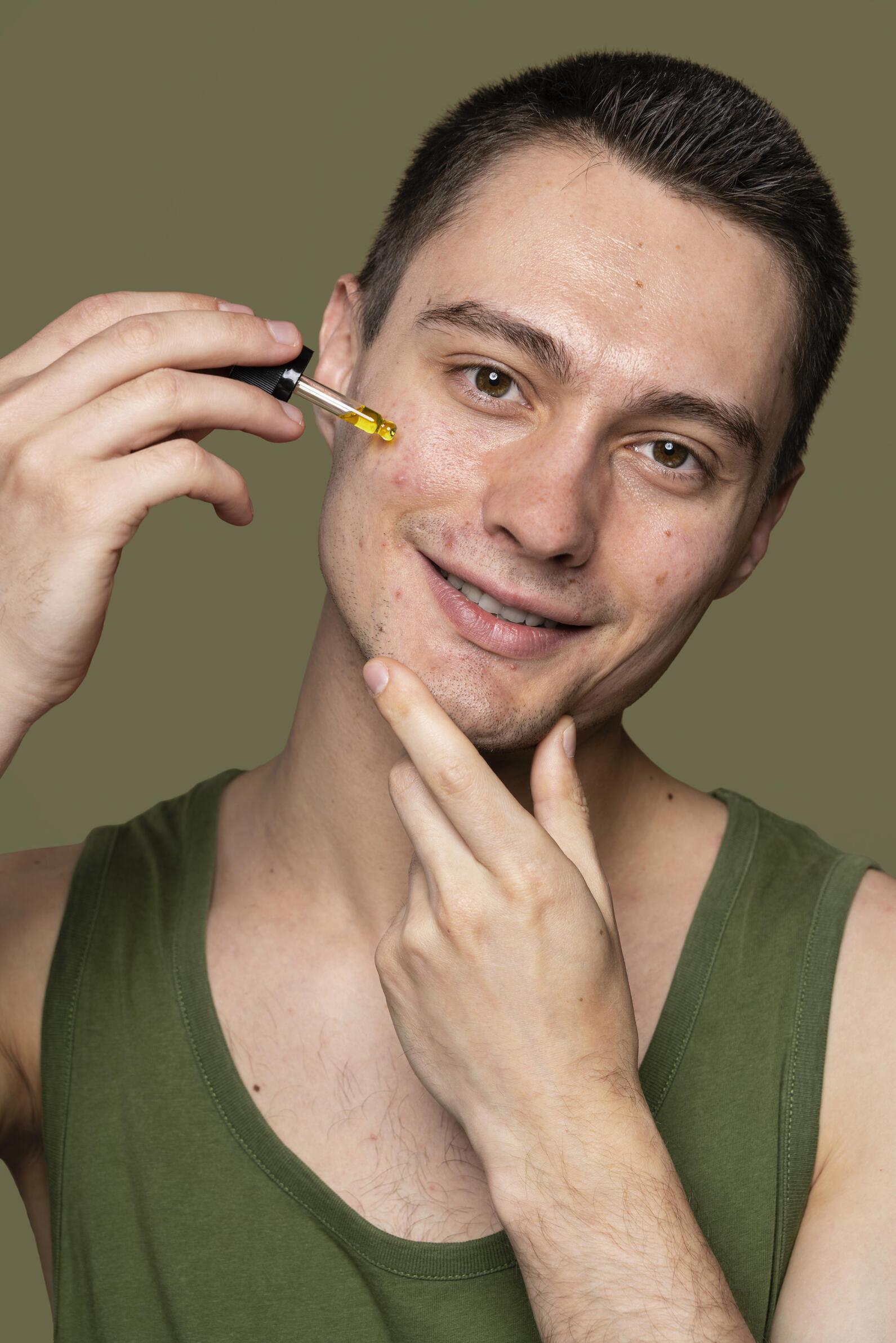
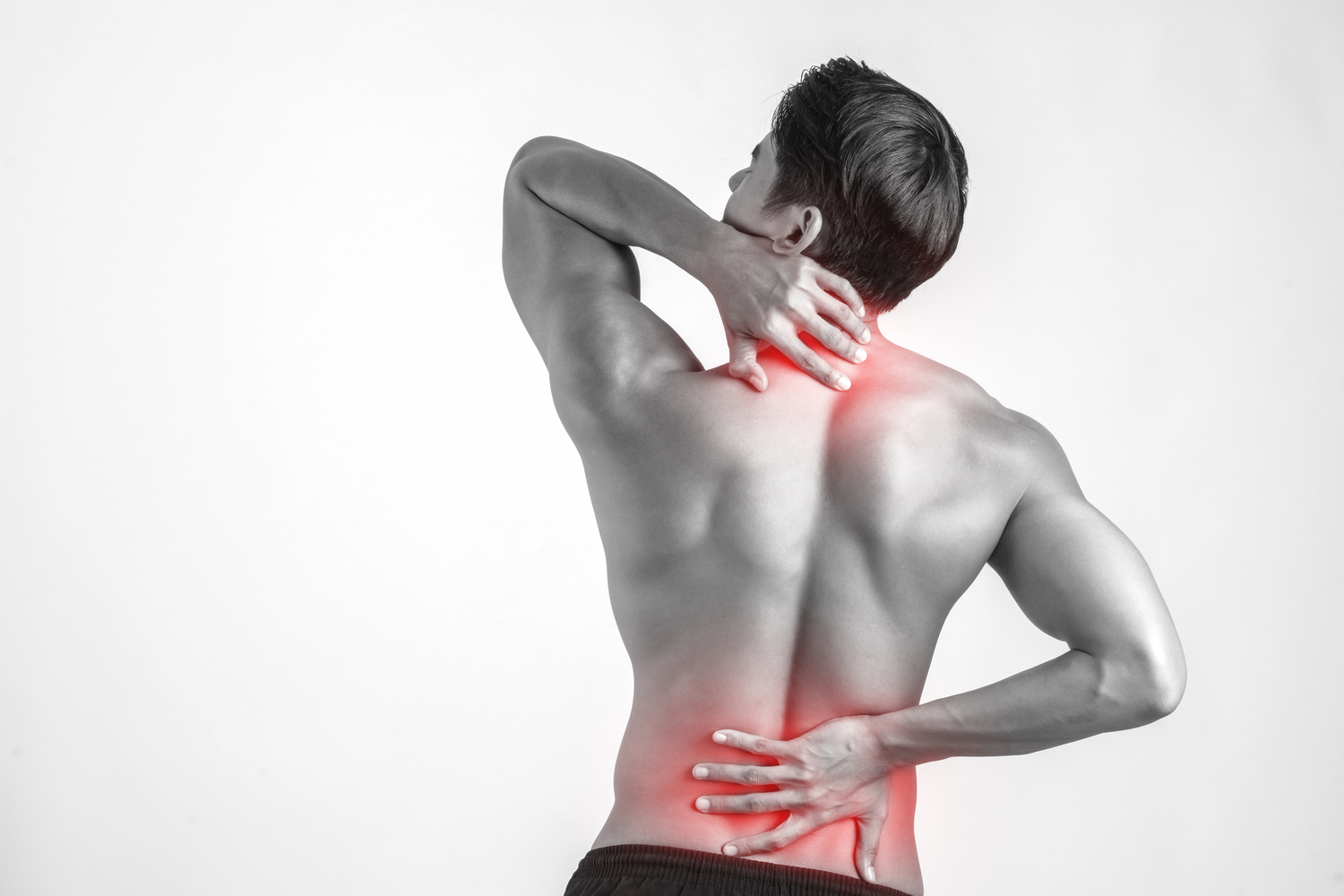
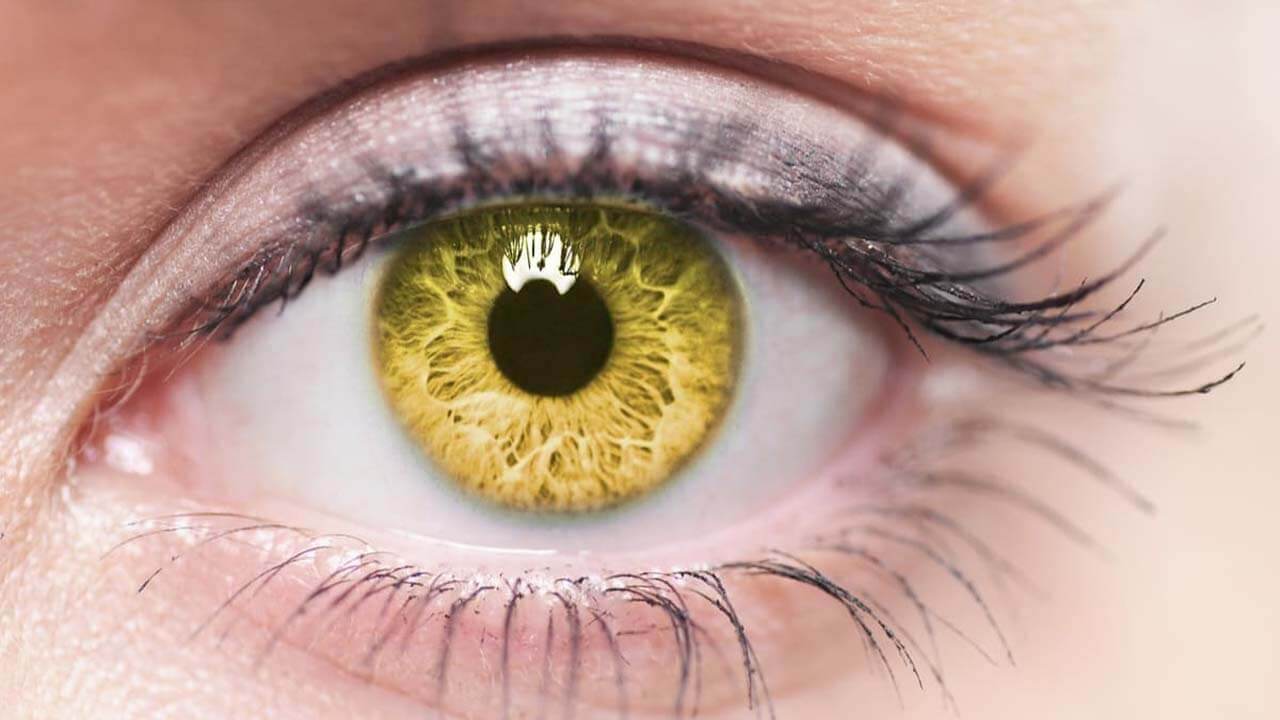
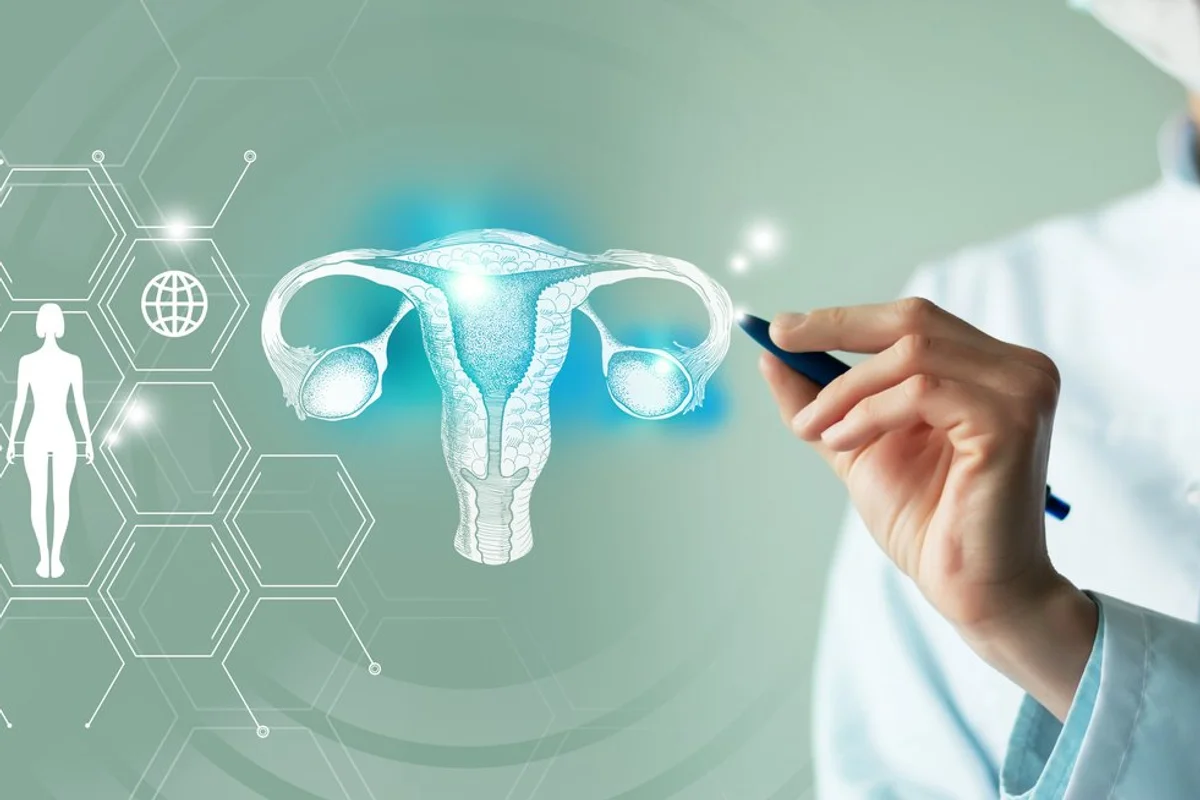
Hey there! I know this is kinda off topic but I was wondering if you knew where I could get a captcha plugin for my comment form? I’m using the same blog platform as yours and I’m having problems finding one? Thanks a lot!
i am not facing any sort of problem as mentioned by you, please search google for the desired plugin or info.
Thanks for your article on the traveling industry. We would also like contribute that if you are a senior taking into account traveling, it can be absolutely imperative that you buy travel insurance for golden-agers. When traveling, golden-agers are at biggest risk of having a healthcare emergency. Buying the right insurance cover package for your age group can protect your health and give you peace of mind.
My apology but this article is not from traveling industry
WONDERFUL Post.thanks for share..extra wait .. ?
Nope you dont need to wait extra any more 😉
I together with my pals happened to be checking the nice helpful hints on the website then immediately got a terrible suspicion I had not thanked the blog owner for those tips. My young men had been thrilled to read all of them and already have pretty much been using these things. Many thanks for truly being so considerate and then for figuring out some exceptional ideas most people are really needing to be informed on. My very own sincere apologies for not expressing appreciation to you sooner.
Your feedback is valuable to us , I hope you will visit this website more often
I have noticed that over the course of making a relationship with real estate homeowners, you’ll be able to get them to understand that, in every real estate transaction, a percentage is paid. Ultimately, FSBO sellers really don’t “save” the percentage. Rather, they fight to earn the commission by way of doing a strong agent’s task. In completing this task, they invest their money plus time to execute, as best they can, the tasks of an adviser. Those tasks include disclosing the home via marketing, showing the home to buyers, building a sense of buyer emergency in order to make prompt an offer, scheduling home inspections, dealing with qualification checks with the financial institution, supervising maintenance, and assisting the closing of the deal.
I appreciate, cause I found just what I was looking for. You have ended my 4 day long hunt! God Bless you man. Have a nice day. Bye
Super Cool , Keep visiting the blog often
I was curious if you ever considered changing the layout of your website? Its very well written; I love what youve got to say. But maybe you could a little more in the way of content so people could connect with it better. Youve got an awful lot of text for only having one or 2 images. Maybe you could space it out better?
Yeah i am thinking about adding more images and making these article look more entertaining, if you have any suggestions do let us know.